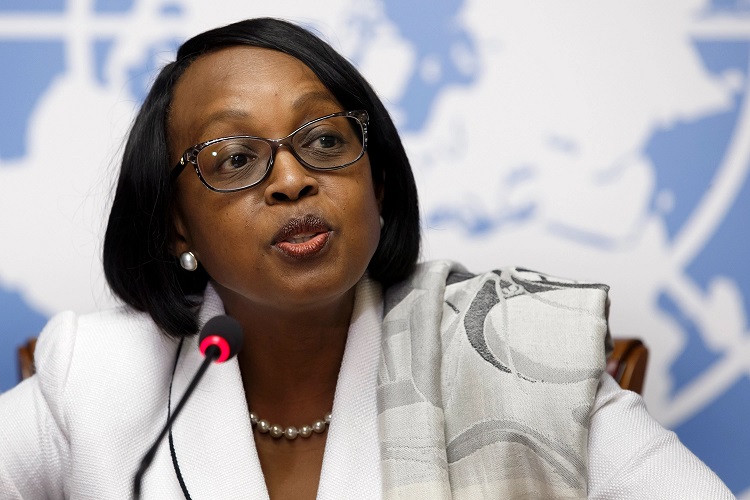By Dr Matshidiso Moeti
In 2020, World Health Organization (WHO) launched the Global strategy to accelerate the elimination of cervical cancer. This was a historic moment, at which all WHO Member States committed to eliminating cancer. This commitment offered hope to many women around the world.
Around 660 000 new cases and some 350 000 deaths from this cancer occur annually, most of which are in low- and middle-income countries, which bear the burden of the highest rates of cervical cancer incidence and mortality.
At the moment, we are losing one of our society’s most precious assets: 76 000 African women die of this disease annually in the prime of their lives. This is unjust and unacceptable as we have the tools and resources to remedy this situation. Africa can’t afford to lose another generation of women to cervical cancer.
The global strategy focuses on three key pillars: vaccination, screening and treatment, and outlines clear targets for each pillar to be met by 2030 to ensure elimination is achieved as per the WHO 90-70-90 targets:
90% of girls are fully vaccinated against human papillomavirus (HPV), which causes almost all cervical cancers, by age 15;
70% of women are screened with a high-performance test by age 35 and again by age 45;
and 90% of women identified with precancerous lesions or cervical disease receive treatment, including palliative care.
Cervical cancer is curable if detected early and treated appropriately.
WHO’s updated recommendation for a single-dose HPV vaccine, as well as updated recommendations to simplify and increase access to screening and treatment, have the potential to reduce barriers to implementing this strategy. This has particular importance in Africa, home to most of the countries with the highest burden of cervical cancer and where access to screening and treatment is still limited. In addition, in November 2023 the WHO Africa Regional Immunization Technical Advisory Group (RITAG) urged countries to adopt a single-dose schedule for the HPV vaccine in Africa to advance vaccination efforts, in line with the WHO recommendation in 2022.
Meeting our agreed global and regional targets, in the world and in particular the African Region, demands intensified and coordinated efforts by all stakeholders to achieve the 90-70-90 targets by 2030. Collectively, we are beginning to lay the foundations to realize that vision.
During 2023, at the WHO Regional Committee for Africa, an event co-hosted by WHO Regional Office for Africa, the World Bank, the governments of Comoros, Liberia and Malawi and other partners- was held in Gaborone, Botswana. The theme was Building a foundation for Africa free of cervical cancer: reaffirming commitments to eliminate cervical cancer as a public health problem in the African Region. During this event, Member States, multilaterals, donors and Civil Society Organizations stressed the urgency of an integrated approach to improving investments to address gaps in HPV immunization and in cervical cancer elimination across the ecosystem of funders operating in the African region.
Subsequently, in the first-ever Forum on Cervical Cancer Elimination held in Cartagena de Indias in March 2024, co-hosted by the governments of Colombia and Spain alongside WHO, the World Bank and the Global Financing Facility (GFF) and other partners, the World Bank and the GFF reaffirmed its strong commitment to support cervical cancer elimination with new investments of at least US$ 400 million for HPV-related programming over the next three years. Additionally, the World Bank is also a core partner of Gavi, the Vaccine Alliance, which has an ambitious new plan to immunize 86 million girls in low- and middle-income countries by 2025, aiming to avert over 1.4 million deaths from cervical cancer.
Currently, the World Bank is providing financing for HPV vaccination in Ethiopia, Nigeria, Madagascar, Uganda and Mozambique. More projects are under preparation, particularly in Africa. Additionally, the GFF can provide catalytic financing and technical assistance within and outside the health sector such as education and social protection-to reach in- and out-of-school adolescent girls who are often marginalized by health and school systems. This highlights the critical importance of a cross-sectoral approach to the prevention and control of cervical cancer.
As a follow, up to commitments made by the Democratic Republic of the Congo at both the Gaborone and the Cartagena events, a launch event to promote the cervical cancer elimination strategy was held in Kinshasa on November 14-16 2024, funded by the Bill and Melinda Gates Foundation and the World Bank. The government of the Democratic Republic of the Congo welcomed health professionals, donors, implementing partners and civil society to prioritize this issue and work together, to accelerate access to prevention, diagnosis and treatment for more generations of girls and women.
It was also a particular privilege and honour to host cervical cancer survivors and the youth, represented by students of the School of Design of Kinshasa. These often-neglected stakeholders represent the many women in the region who have no political voice and who do not receive equitable and effective healthcare. Their stories and voices bring life to numbers, urging us all to take action.
There is progress in the region, particularly in relation to vaccination –29 out of 47 countries in the African Region have introduced the HPV vaccine into their national immunization programs and 40 % of the girls have received at least one dose. However, to achieve the 90-70-90 targets, more needs to be done.
Let us remind ourselves that women’s health is a human right and a major determinant of our nations’ health and the health of future generations.
Let’s double down our collective efforts to address this public health crisis in the region.
Dr Matshidiso Moeti, WHO Regional Director for Africa.








